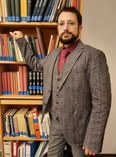Andrea Cuomo - MELA
Description of the PI

Description of the project
Multiple registers coexisting within the same linguistic system and the creation of grammars codifying one of these registers as ‘the standard’ are phenomena common to many languages.
The same issues are observed in the remarkable history of Greek, where the high-register variety has competed with other, lower-register varieties in a relation of mutual influence throughout the centuries. Recent scholarship has devoted attention to these dynamics, primarily focusing either on the earlier (Post-classical) or the later (Early Modern/ Modern) stages.
The central period, essential to our understanding of the development of the language, has not received the same attention. Yet, the late Byzantine era provides exceptional sources: the very textbooks and manuscripts of the time, which offer a direct view onto the dynamic attitudes of medieval users toward their language.
MELA maintains that, if studied with an innovative combination of philological and paleographical approaches, alongside new insights from the Digital Humanities, socio-linguistics and semiotics, these neglected sources will change our understanding of Medieval Greek language and literature.
MELA will put Medieval Greek in dialogue with current debates in linguistics, and recast our view of such an important period for the cultural history of Europe. The project will create: 1) the first Digital Grammar of the high-register Greek taught at medieval schools; 2) a new theoretical framework to study (a) how languages and standardization work in general; (b) the dynamic relationships ‘language-society’, ‘language-human mind’, ‘linguistic register(s)-social functions’.
The Grammar, a textual corpus database equipped with multiple search options will be the instrument that brings about a paradigm shift in the study of language by disclosing the perspective of medieval users. The theoretical framework will make Medieval Greek an important locus for applying, testing, and verifying current linguistic theories.